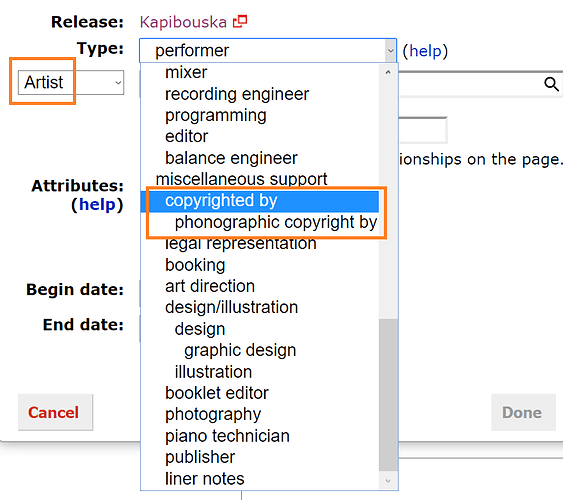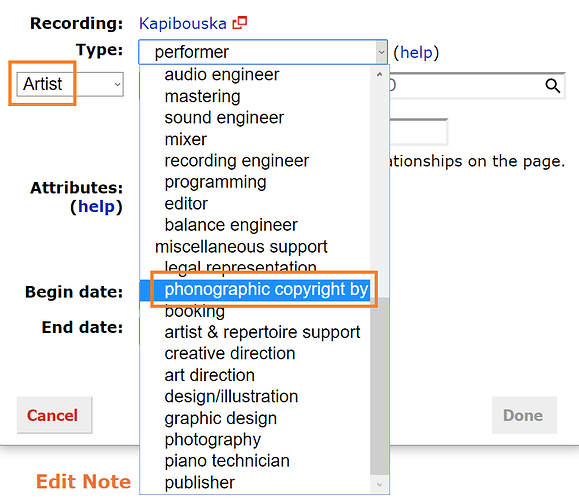At the moment we only can add companies as copyrights holder for an edition. But very often it’s the author itself or in the case of Virginia Woolf, her nephew and her niece. Since I don’t like the idea of “fake companies” to add them, we need a new relation possibility for the copyrights.
This is a topic about BookBrainz, not MusicBrainz.
Right you are! I did not notice at first… And here I thought I was being helpful 
@Lotheric you have been helpful as I was unaware of how MB functions. At least now I know various credit roles can be supported. It certainly gives more scope to develop BB.
Indeed, that’s what I thought when I started submitting to MB to find out in which direction BB might develop. The possibilities are fantastic. I’m really looking forward to see how this BB-“baby” will develop into something unique and great ![]()
“O brave new world”. I just wish I had of discovered BB earlier instead of travelling along the road to nowhere (aka Bookogs). Still it was fun while it lasted!
This should be covered by this ticket: https://tickets.metabrainz.org/browse/BB-504, and should land soon!
Hi! This should be up on Beta now, there are still some issues that need ironing out - but you can atleast add the relation and wont need to create “fake” companies :)
Was this really meant only as a “author”-“work” relationship? It’s a welcome update but to be honest, I can’t recall myself adding any works where I was missing it. It’s rather common I’ve needed to document the © on editions, and preferably with a supplementary field for the date. So I’ve used the annotations field but not since the beginning and always.
Yes, it just works in one direction - you only can add this from the author’s page. The Copyright relation to an author doesn’t appear in the edition form.
Not a big problem and you might be already aware of this issue…
Ah no I was not aware of this, @mr_monkey have you seen this?
As an aside, I don’t code, I’m only writing style/relationships/etc stuff for now - I’ve always wanted ot learn to code, but alas I’ve never had the time :D
Can you really create the “author”-“edition” © relationship from the author’s page?
For me there’s only the “author”-“work” © option, see my previous post here.
Any comments on that, @ApeKattQuest_MonkeyPython or @mr_monkey?
No, you’re right, it’s only for the work, but is should be used for editions, of, course…
ok I have tested (on beta, mind) and I can see the © Copyright relation on both the author and work side
this relation doesn’t exist (yet?) between author - edition
a) because I haven’t yet done these (for now, only work-work and author-work are done)
b) because I’m not certain this should be an author-edition relation (if it is then possibly author-work should be removed?)
regarding a) I am actually currently working on it! (but I also am working on MB instruments which I have neglected for too long, so it will take some time) and regarding b) I’d love for some discussion about this!
I actually wanted to ask, are anyone here comfortable with irc? We have an irc channel on freenode BookBrainz it’d be great to have more bookbrainz community there :D
Since copyrights are not permanent (they expire after a certain amount of years, in the US they can be sold, or the owner dies and it passes to the heir/ess), the relationship should be “author-edition” imo.
Would having both (and more) relationships be confusing?
I think Author-Work, Author-Edition, Publisher-Edition and perhaps even Publisher-Work could be necessary to describe all the possible cases I can think of, or read about.
This FAQ from the Author’s Alliance has some helpful comments, from this question onwards:
Do authors always own copyrights in the works they have created?
No. The constitutional and congressional bestowal of rights on authors does not mean that all authors own copyrights to the works they have created. In fact, they often do not. Under some circumstances, the individual people one might refer to as the “authors” of copyrightable works are not considered authors as a legal matter at all. Instead, under the “work made for hire” doctrine, their employers (or sometimes a commissioning party outside of the employment context) are deemed to be the authors and therefore the initial copyright owners.
[…]
Where the work made for hire doctrine does not apply, authors may start out as copyright owners but give or sell their copyrights to others. Indeed, the practice of authors transferring their copyrights to publishers has been commonplace since the Statute of Anne first granted copyrights to authors. Authors might sell their copyrights to publishers for a lump sum, or for royalties based on how many books the publisher sells, or a combination of the two. In today’s academic publishing environment, for example, authors frequently transfer their copyrights to journal publishers for free—realizing their rewards in terms of publication in a prestigious outlet as opposed to direct monetary gain. What publishers get in exchange is the ability to control when and how many copies are published, at what prices those copies are offered in the market, under what circumstances new editions are produced, and more.
And also this page about US copyright law: Copyright Ownership: Who Owns What? - Copyright Overview by Rich Stim - Stanford Copyright and Fair Use Center
I don’t think we need an author-work or publisher-work relation at all in this case. The copyright relations are only relevant for the edition they are printed into and the respective time period.
Do you have an example showing the necessity to relate a copyright to a work?
I am pretty sure we will find cases where an author owns or used to own* copyright of their work.
For an example, from the same website I quoted from earlier in this topic:
Instead, authors are increasingly retaining their copyrights and managing them in innovative ways. For example, many authors who publish in academic journals retain their copyrights and grant the journals rights that are entirely non-exclusive, rights that are exclusive only for a limited period of time (e.g., 6 months), or exclusive rights that pertain only to the publisher’s final formatted version and not to the author’s “pre-print” version. By choosing not to transfer all exclusive rights for all time, authors retain some rights to reproduce, distribute, and revise their own works.
[…]
Some are allowing publishers to print and sell hard copy books that are also available for free download under Creative Commons licenses.
* about “used to own”: We will also eventually have date attributes for relationships, so that for example we could have multiple relationships to describe how the copyright got transferred:
“Author X owned the copyright to Work Y from 1936 to 1952”
and “Publisher Z owns the copyright to Work Y (1952- present)”
I still firmly believe that the Edition is the correct place for recording copyright details from the submitted article.
I personally don’t know of a comprehensive online resource where you can obtain the copyright history of authors and their works. One exception is http://www.isfdb.org/ where copyright details are usually recorded for a particular publication.
Recording it on the Work also means an additional edit is required when submitting an Edition, which may or may not get done.
If it really has to be recorded on the Work, then maybe an automatic system that copies and transfers the data from the Edition to the Work could be implemented at some stage.

